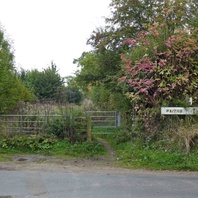
Viking Names
Waithe
Waithe, in the Haverstoe Wapentake of Lincolnshire, is thought to be originally derived from Old English (ge)wæd ‘a ford’. By the later twelfth century, the -d- was replaced by -th- either because of the Scandinavianization of the pronunciation, or by the replacement of (ge)wæd with its Old Norse cognate vað ‘a ford’. In both cases the meaning of the name is ‘at the ford’, which must be over Waithe Beck, where a minor road crosses the stream half a mile east of the church.
Read More
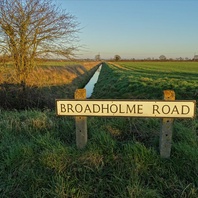
Viking Names
Broadholme
Broadholme, in the West Lindsey district of Lincolnshire, comes from the Old Norse male personal name Broddi and the Old Norse element holmr ‘an island, an inland promontory, raised ground in marsh, a river-meadow’. Hence, ‘Broddi’s island’. Historically, the parish belonged to Newark Wapentake, Nottinghamshire, but was transferred to West Lindsey in 1986 by the Local Government Boundary Commission.
Read More
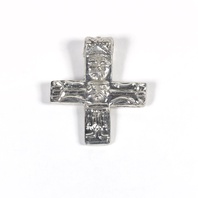
Viking Objects
Reproduction Crucifix Pendant
Crucifixes like this one would have been worn to display one’s faith and may have been a way for newly converted Scandinavians to be more accepted in society. By the late tenth to early eleventh centuries, assimilation would have seen many Scandinavians, both elites and common people, converted to Christianity and adopting Anglo-Saxon ways.
Read More
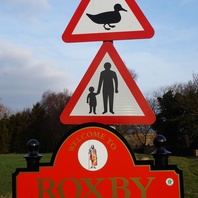
Viking Names
Roxby
Roxby, in the West Riding of Lindsey in Lincolnshire, comes from the Old Norse male name Hrókr and the Old Norse element by ‘farmstead, a village’. Roxby is a joint parish with Risby.
Read More

Viking Names
Kirkby Green
Kirkby Green, in the Langoe Wapentake of Lincolnshire, comes from the Old Norse appellative compound kirkju-by ‘a village with a church’. The affix Green come from Old English grene ‘grassy spot, a village green’
Read More
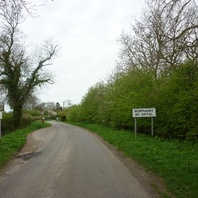
Viking Names
Normanby by Spital
Normanby by Spital, in the Aslacoe Wapentake of Lincolnshire, takes its name from the Old English ethnonym Norðman ‘Northman, Norwegian’ and the Old Norse element bý ‘a farmstead, a village’. A Domesday form of the name, Normanestouu, has as the second element Old English stow ‘a place, a place of assembly’, but this form is not supported by later recordings. The suffix Spital is for its proximity to Spittal in the Street, ‘hospital on a Roman road (Ermine Street)’. Traditionally, the place-name has been interpreted as referring to a settlement of Norwegians (in an area where most of the Scandinavian settlers were Danes). However, the exact implications of such a name are not yet fully understood and are the subject of ongoing work by Dr Jayne Carroll of the Institute for Name-Studies, University of Nottingham. There are other Normanbys in Lincolnshire, Normanby in Burton upon Stather and Normanby by Stow.
Read More
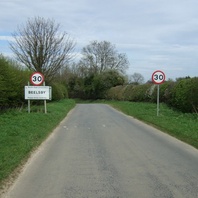
Viking Names
Beelsby
Beelsby, in the Haverstoe Wapentake of Lincolnshire, perhaps comes from the rare Old Norse male personal name Beli and the Old Norse element bý ‘a farmstead, a village’.
Read More
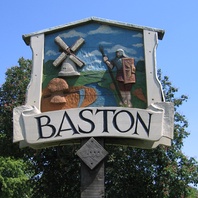
Viking Names
Baston
Baston, in the Ness Wapentake of Lincolnshire, is an Anglo-Scandinavian hybrid compound from the Old Norse male byname Bak meaning ‘back’ and the Old English element tun ‘an enclosure; a farmstead; a village; an estate’.
Read More

Viking Names
Dalby
Dalby, in the South Riding of Lindsey in Lincolnshire, comes from the Old Norse element dalr ‘a valley’ and Old Norse bý ‘a farmstead, village’. Thus the meaning of the place-name is ‘a farmstead, village of the small valley’, which is topographically appropriate.
Read More

Viking Names
Audhild
The Old Norse female personal name Auðhildr is a compound formed of the first element Auð-, which is obscure in origin but perhaps auðr ‘wealth’ or from the stem in auðinn ‘that befalls one’ and jóð ‘new-born baby’, combined with the second element -hildr ‘battle’. A woman by the name of Auðhildr was recorded recorded as having lived in the Orkneys in the early twelfth century. Auðhildr is believed to be the first element in the medieval field name of Odelgateland in Stainburn, West Yorkshire. It also appears in medieval Lincolnshire and Yorkshire documents. However, some forms of the name may represent the Continental Germanic female name Odil.
Read More
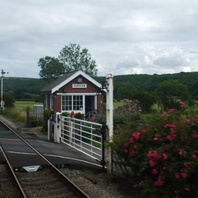
Viking Names
Howsham
Howsham, in the Yarborough Wapentake of Lincolnshire, is a simplex place-name from the dative plural of Old English hūs or Old Norse hús, both elements have the meaning ‘a house; also sometimes used of a building for special purposes’, so húsum ‘at the houses’. The weakly stressed -um was subsequently interpreted as -ham. This is a common formation in Denmark, so the place-name is likely Danish in origin.
